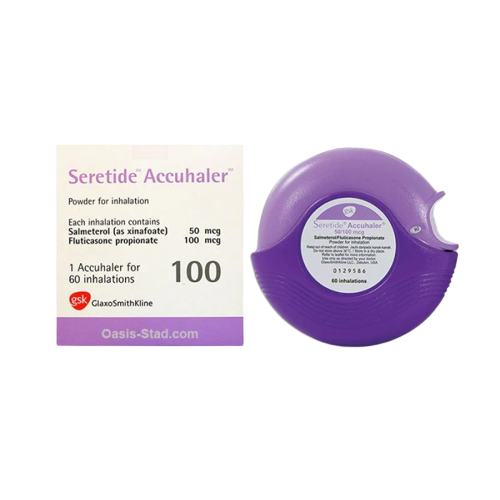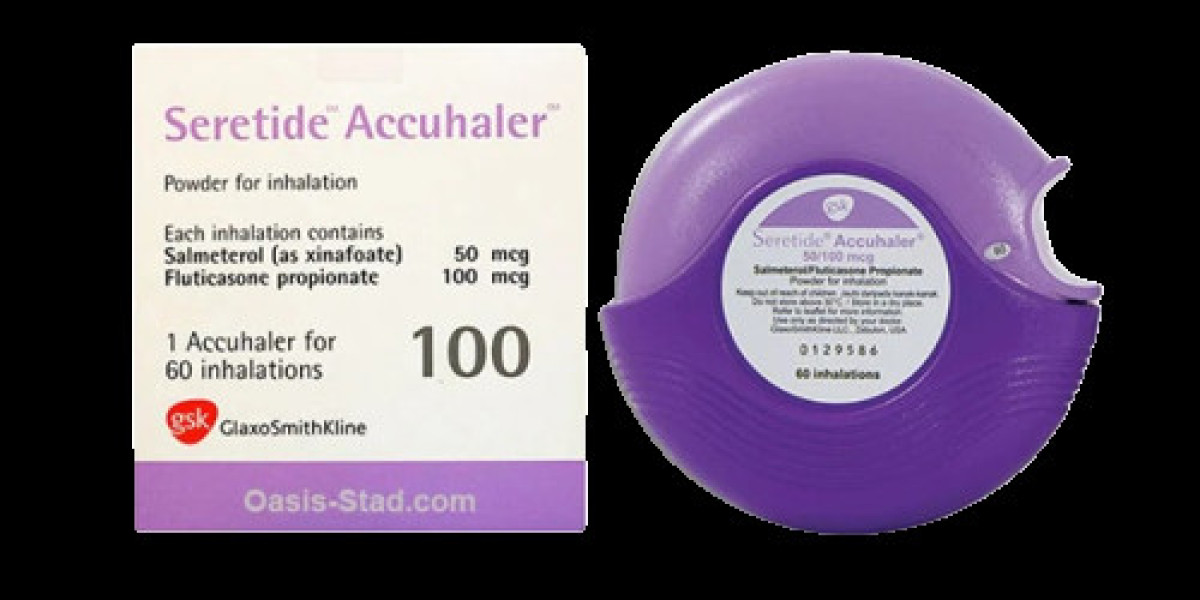Seretide Diskus is a combination medication that contains two active ingredients: fluticasone propionate, a corticosteroid, and salmeterol, a long-acting beta agonist (LABA). It is available in the form of a dry powder inhaler (DPI) and is used for the long-term management of asthma and COPD in patients aged 12 years and older.
How Does Seretide Diskus Work? Fluticasone propionate works by reducing inflammation in the airways, which helps prevent asthma attacks and COPD exacerbations. It also helps to decrease mucus production and swelling in the lungs, making it easier to breathe. Salmeterol, on the other hand, acts as a bronchodilator, relaxing the muscles in the airways and allowing them to open up, thereby improving airflow and relieving symptoms of wheezing, shortness of breath, and chest tightness.
Benefits of Seretide Diskus:
- Effective symptom control: Seretide Diskus provides effective symptom control for both asthma and COPD, helping patients breathe more easily and reducing the frequency and severity of exacerbations.
- Long-acting relief: The combination of fluticasone propionate and salmeterol provides long-acting relief from symptoms, allowing for once-daily dosing and improved compliance.
- Prevention of exacerbations: By reducing airway inflammation and improving lung function, Seretide Diskus helps prevent asthma attacks and COPD exacerbations, leading to better disease management and quality of life.
- Convenient dosage form: Seretide Diskus comes in a convenient dry powder inhaler format, making it easy to use and suitable for patients of all ages.
Dosage and Administration: The recommended dosage of Seretide Diskus varies depending on the severity of asthma or COPD and individual patient response. It is typically administered as one inhalation (50/100 mcg or 50/250 mcg) twice daily, approximately 12 hours apart. The medication should be used regularly, even if symptoms are well controlled, to maintain optimal disease management.
Potential Side Effects: While Seretide Diskus is generally well-tolerated, like all medications, it may cause side effects in some individuals. Common side effects include headache, throat irritation, hoarseness, cough, and fungal infections of the mouth and throat (oral thrush). These side effects are usually mild and transient, but if they persist or worsen, it is important to consult a healthcare professional. In rare cases, Seretide Diskus may also increase the risk of serious asthma-related events or paradoxical bronchospasm (sudden narrowing of the airways), which requires immediate medical attention.
Precautions and Warnings: Before using Seretide Diskus, it is essential to inform your healthcare provider about any underlying medical conditions you may have, especially heart disease, high blood pressure, diabetes, thyroid disorders, and seizures. Additionally, Seretide Diskus may interact with certain medications, such as beta-blockers and monoamine oxidase inhibitors (MAOIs), so it is crucial to disclose all medications you are currently taking to avoid potential drug interactions.
Conclusion: Seretide Diskus is a widely prescribed medication for the long-term management of asthma and COPD. By combining the anti-inflammatory properties of fluticasone propionate with the bronchodilator effects of salmeterol, it provides effective symptom control and helps prevent exacerbations, leading to improved disease management and quality of life for patients. However, it is important to use Seretide Diskus as directed by a healthcare professional and to be aware of potential side effects and precautions associated with its use. With proper management and adherence to treatment, individuals with asthma and COPD can lead healthy and active lives.
















